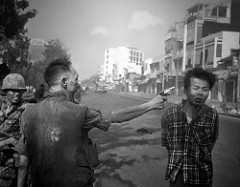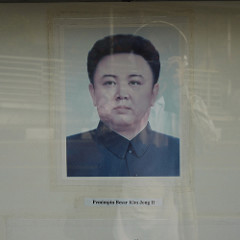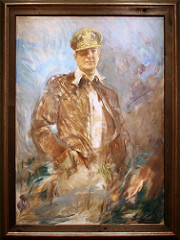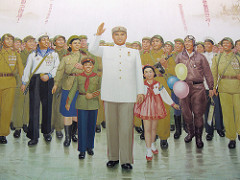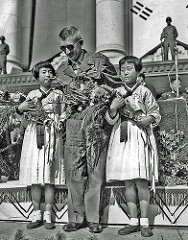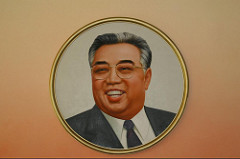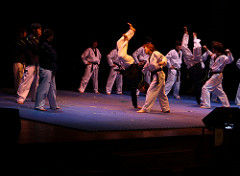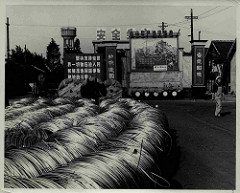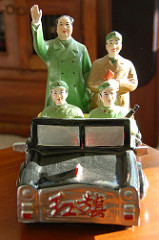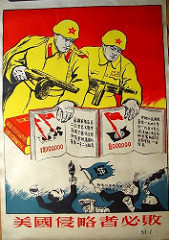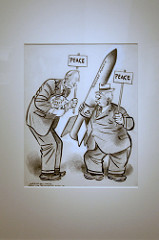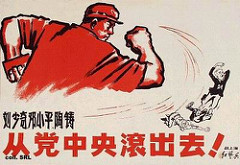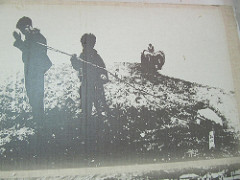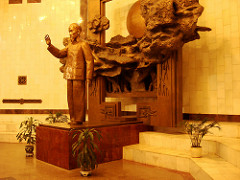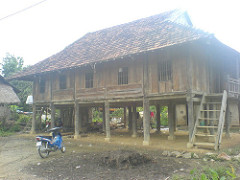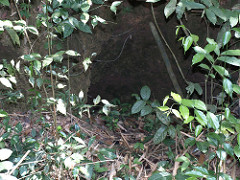Mao Zedong
Leader of the Chinese Communist Party (1927-1976). He led the Communists on the Long March (1934-1935) and rebuilt the Communist Party and Red Army during the Japanese occupation of China (1937-1945). (789)
Tet Offensive
1968; National Liberation Front and North Vietnamese forces launched a huge attack on the Vietnamese New Year (Tet), which was defeated after a month of fighting and many thousands of casualties; major defeat for communism, but Americans reacted sharply, with declining approval of LBJ and more anti-war sentiment
Kim Jong IL
son of Kim Il Sung, became ruler of North Korea after his father's death. He developed nuclear weapons.under his rule the North Korean economy has continued to deteriorate
General Douglas MacArthur
Commander of the UN forces at the beginning of the Korean War, however President Harry Truman removed him from his command after MacArthur expressed a desire to bomb Chinese bases in Manchuria.
Liberal Democratic Party
Monopolized Japanese government from its formation in 1955 into the 1990s; largely responsible for the economic reconstruction of Japan.
People's Democratic Republic of Korea
Northern half of Korea dominated by USSR; long headed by Kim II-Sung; attacked south in 1950 and initiated Korean War; retained independence as a communist state after the war.
Republic of Korea
Southern half of Korea sponsored by United States following World War II; headed by nationalist Syngman Rhee; developed parliamentary institutions but maintained authoritarian government; defended by UN forces during Korean War; underwent industrialization and economic emergence after 1950s
Syngman Rhee
Imprisoned by the Japanese in WW2, then came to America and studied at Harvard and Princeton; Struggled for Korean freedom for 50 years and was elected president of South Korea, He was the American-favored candidate, Korean nationalist. He was elected president. Supported Anti-communism.
Kim IL Song
First Leader of N Korea. He wanted to unify N and S Korea militarily and thought 1950 was the perfect opportunity b/c the US has recently decided that Korea is not part of the United states Western Defensive Perimeter. He wants the help of Mao and Stalin, who are both very reluctant to get involved. He misjudged the political situation, and the Korean war is known as Kim Il Sung's war.
Taiwan
Island off Chinese mainland; became refuge for Nationalist Chinese regime under Chiang Kai-shek as Republic of China in 1948; successfully retained independence with aid of United States; rapidly industrialized after 1950s.
Pacific Rim
Region including Japan, South Korea, Singapore, Hong Kong, and Taiwan; typified by rapid growth rates, expanding exports, and industrialization; either Chinese or strongly influenced by Confucian values; considerable reliance on government planning and direction, and limitations on dissent and instability.
Hong Kong
British colony on Chinese mainland; major commercial center; agreement reached between Britain and People's Republic of China returned colony to China in 1997.
Yukio Mishima
Most popular writer in Japan, modern samurai, formed an army and tried to overthow government after WWII and killed himself, , This author wrote about Kazu's marriage to Noguchi in the novel After the Banquet. Name this Japanese author who included the novels Spring Snow and The Decay of the Angel, also known as Hiraoka Kimitoke.
Park Chung-hee
Was a Republic of Korea Army general and the dictator of South Korea (the Republic of Korea) after Syngman Rhee, from 1961 to 1979. He has been credited with the industrialization of the Republic of Korea through export-led growth. His rule was ended by his assassination in 1979 by his intelligence director.
Hyundai
Example of huge industrial groups that wield great power in modern Korea; virtually governed Korea's southeastern coast; vertical economic organization with ships, supertankers, factories, schools, and housing units.
Tae Kwon Do
What martial art originated in Korea?
Chiang Ching-Kuo
Son and successor of Chiang Kai-shek as ruler of Taiwanese government in 1978; continued authoritarian government; attempted to lessen the gap between followers of his father and indigenous islanders
Lee Kuan Yew
Ruler of Singapore from independence in 1959 to present; established tightly controlled authoritarian government; ruled through People's Action party to suppress political diversity.
Singapore
Part of the British colony of Malaya with a mostly Chinese population; after World War II emerged as a flourishing, independent city-state.
People's Action party
What is the sole political party in Singapore since 1965?
Little Tigers
Earliest and most successful imitators of the Japanese model for economic development; they were Hong Kong, Singapore, South Korea, and Taiwan; turned disadvantages into advantages through a program of export-driven industrialization; corporations from these 4 states undercut original Japanese products w/ lower-costing versions; the original 4 were later joined by Indonesia, Thailand, & Malaysia
Mass line
Economic policy of Mao Zedong; led to formation of agricultural cooperatives in 1955; cooperatives became farming collectives in 1956.
Great Leap Forward
Economic policy of Mao Zedong introduced in 1958; proposed industrialization of small-scale projects integrated into peasant communes; led to economic disaster; ended in 1960.
Party Cadres
Basis for China's Communist government organization; cadre advisors were attached to military contingents at all levels.
Lin Biao
Behind the cultural revolution. Was claimed to be the successor of Mao. Biao wanted the CR to go on longer than Mao did, so Mao called him a traitor, later killing him in a plane crash., He collected Mao's works and published, Quotations from Chairman Mao Zedong, also known as "The Little Red Book."
People's Liberation Army
Chinese Communist army; administered much of country under People's Republic of China.
Khrushchev
He emerged as the Soviet leader two years after the death of Stalin. He talked about peaceful coexistence with the U.S.; listened and began to bargain with the U.S. but the U-2 spy plane incident ended all potential for progress.
One Child Policy
Restrictive, antinatalist policy in China that aimed at immediately reducing China's birth rate to replacement level and below. Is going to reult in a deficit of 50 million women relative to men by 2050.
Pragmatists
Chinese Communist politicians such as Zhou Enlai, Deng Xiaoping, and Liu Shaoqui; determined to restore state direction and market incentives at the local level; opposed Great Leap Forward.
Zhou Enlai
A prominent and influential member of the Chinese Communist Party during the time of Mao. He played a large role in China's reestablishing ties with the West.
Liu Shaoqi
He was a moderate CCP politician and designated successory to Mao Zedong. He died during the cultural revolution. He held the position of official headship of state, and had a strong base in the parties. He came to power after Mao stepped away following GLF. He rolled back Mao's reforms but kept China's communistic views in tact.
Deng Xiaoping
One of the more pragmatic, least ideological of the major Communist leaders of China; joined the party as a young man in the 1920s, survived the legendary Long March and persecution during the Cultural Revolution of the 1960s, and emerged as China's most influential leader in the early 1980s.
Jiang Qing
Wife of Mao Zedong; one of Gang of Four; opposed pragmatists and supported Cultural Revolution of 1965; arrested and imprisoned for life in 1976.
Cultural Revolution
Movement initiated in 1965 by Mao Zedong to restore his dominance over pragmatists; used mobs to ridicule Mao's political rivals; campaign was called off in 1968.
Red Guard
Student brigades utilized by Mao Zedong and his political allies during the Cultural Revolution to discredit Mao's political enemies
Gang of Four
Jiang Qing and four political allies who attempted to seize control of Communist government in China from the pragmatists; arrested and sentenced to life imprisonment in 1976 following Mao Zedong's death.
Tayson Rebellion
Peasant revolution in southern Victnam during the late 1770s; succeeded in toppling the Nguyen dynasty; subsequently unseated the Trinh dynasty of northern Vietnam.
Nguyen Anh
Last surviving member of Nguyen dynasty following Tayson Rebellion in Vietnam; with French support retook southern Vietnam; drove Tayson from northern Vietnam by 1802; proclaimed himself emperor with capital at Hue.
Minh Mang
Second emperor of a united Vietnam; successor of Nguyen Anh; ruled from 1820 to 1841; sponsored emphasis of of Confucianism; persecuted Catholics., Gia Long son
Vietnamese Nationalist Party
Also known as the Vietnamese Quoc Dan Dong or VNQDD; active in 1920s as revolutionary force committed to violent overthrow of French colonialism.
VNQDD
The Viet Nam Quoc Dan Dang, a revolutionary group committed to creating a democracy
Communist Party of Vietnam
Originally a wing of nationalist movement; became primary nationalist party after decline of VNQDD in 1929; led in late 1920s by Nguyen Ai Quoc, alias Ho Chi Minh.
Ho Chi Minh
Also known as Nguyen Ai Quoc; led Vietnamese Communist party in struggle for liberation from French and U.S. dominance and to unify north and south Vietnam.
Viet Minh
Communist-dominated Vietnamese nationalist movement; operated out of base in southern China during WW II; employed guerilla tactics similar to Maoists in China.
Vo Nguyen Giap
Chief military commander of Viet Minh; architect of vietnamese victory over french at Dien Bien Phu in 1954.
Dien Bien Phu
French fortress in northern Vietnam that surrendered in 1954 to the Viet Minh; the defeat caused the French to abandon Indochina and set the stage for the Geneva Conference, which divided the region and led to American involvement in Vietnam.
Ngo Dinh Diem
Political leader of South Vietnam; established as president with United States support in the 1950s; opposed Communist government of North Vietnam; overthrown by military coup support by United States
Viet Cong
Name given by Diem regime to Communist guerrilla movement in southern Vietnam; reorganized with northern Vietnamese assistance as the National Liberation Front in 1958.
Four Modernizations
An economic and social program that called for limited privatization of agriculture and industry, encouraged foreign investment and foreign trade, and resulted in a boost for the Chinese economy. Unlike the Great Leap Forward, the Four Modernizations was an economic success. Sugested by Deng Xiaoping.

